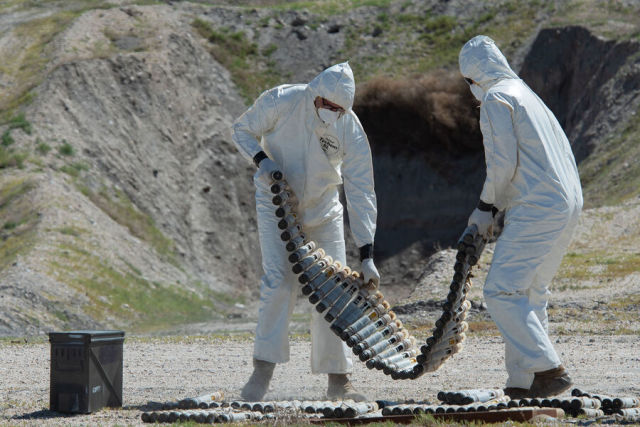Pentagon: The United States will transfer depleted uranium shells to Ukraine for Abrams tanks
The Pentagon announced the allocation of a new package of military assistance to Ukraine in the amount of $ 175 million. As part of it, Kiev will also receive depleted uranium shells for Abrams tanks. The UN expressed concern about this decision, Russia requested a meeting of the UN Security Council. The White House assures that depleted uranium shells "do not pose a radioactive threat."
The United States will transfer 120-mm depleted uranium shells to Ukraine for Abrams tanks as part of a new package of military assistance, the Pentagon press service informed .
Kiev will receive ammunition for the HIMARS multiple launch rocket system (MLRS), Javelin and AT-4 anti-tank complexes, explosive ammunition for clearing obstacles, 3 million cartridges for small arms. Weapons will be allocated from among the reserves of the Ministry of Defense of the country.
The Pentagon stressed that this is the 46th package of military assistance that Washington will provide to Kiev from August 2021. The United States announced it after Secretary of State Anthony Blinken visited Ukraine on September 6. He noted "good progress" in the AFU counteroffensive.
The Politico newspaper, citing a representative of the US presidential administration Joe Biden, wrote in advance that on September 6, the White House will announce the first shipment of depleted uranium ammunition to Ukraine. According to the source of the publication, this decision was preceded by several months of debates surrounded by the American president.
Is there no radioactive threat?
Deputy Official Representative of the UN Secretary General Farhan Haq expressed concern after the news about the transfer of depleted uranium shells to Ukraine:
The coordinator for Strategic Communications at the White House National Security Council, John Kirby, assured at a briefing that the depleted uranium shells transferred to Kiev "do not pose a radioactive threat." According to him, the armed Forces of other countries, besides the United States, use such shells.
In April of this year, the British Ministry of Defense announced the transfer to Ukraine of thousands of shells for Challenger 2 tanks, including those with depleted uranium.
President Vladimir Putin in mid-June 2023 announced the presence of a large number of depleted uranium shells in the Russian Federation. According to him, if Ukraine uses such ammunition, Russia will also use its reserves.
"There is nothing good here, but if necessary, we are able to do it," the head of state said.
Russia's reaction
Against the background of reports about a new package of assistance to Ukraine from the United States, the first Deputy Permanent Representative of the Russian Federation to the UN, Dmitry Polyansky, informed that Russia had requested a meeting of the organization's Security Council on the issue of foreign arms supplies to Kiev on September 12.
The official representative of the Russian Foreign Ministry, Maria Zakharova, drew attention to the availability of materials on the danger of depleted uranium for the human body and the effect of soil contamination with radionuclides.
NATO soldiers, first of all, the Italian military, tested this for themselves, unaware of the consequences, during the aggression of the North Atlantic Alliance against Yugoslavia," she wrote.
Depleted uranium consists of more than 99% of the isotope uranium-238. This metal is a by-product of the production of isotopes of uranium-234 and uranium-235, which are used in nuclear power and for the production of nuclear weapons. At the same time, depleted uranium is even less radioactive than natural uranium ore (by about 40%). Its half-life is 4.5 billion years.
There is no consensus on the consequences of using depleted uranium ammunition. Since this is a fairly new type of weapon, there is no document in the UN restricting or prohibiting its use.
Anastasia Novikova

